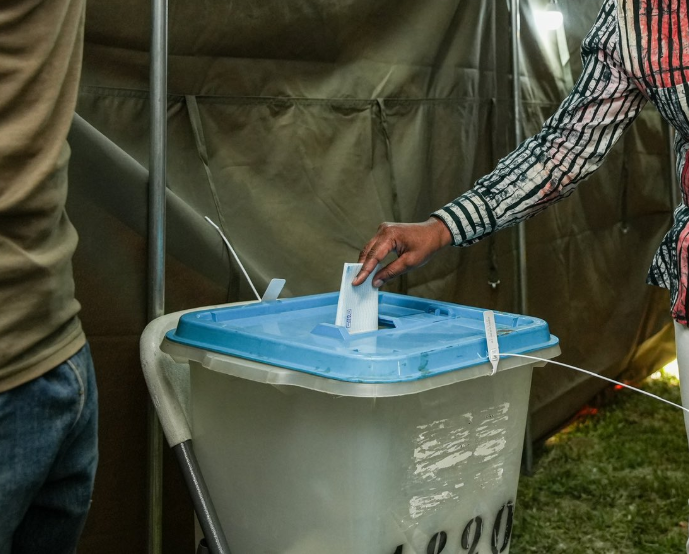Windhoek – Namibians were still voting early on Thursday, hours after polls were scheduled to close in a presidential and legislative election set to test the ruling party’s 34-year grip on power in the southern African nation.
Logistical issues left crowds waiting to vote although polls were scheduled to close at 09:00 pm (1900 GMT) on Wednesday.
Ballot counting had started at some polling stations with early results initially expected by Saturday according to the electoral calendar.
In the face of criticism from political parties and voters over the long queues, the Electoral Commission of Namibia (ECN) said it was extending voting hours.
[WATCH] The electoral commission of Namibia says the commission was overwhelmed by the high number of people who turned out to vote. The commission had to make arrangements to allow voters who were at the polling stations to cast their ballots after nine PM last night. SABC News… pic.twitter.com/BX8VsaAjMw
— SABC News (@SABCNews) November 28, 2024
On Thursday morning, “some people were still voting,” ECN spokesperson Siluka De Wet told AFP.
At the University of Science and Technology in Windhoek, voting stopped at 05:00 am on Thursday, polling officers told AFP.
The vote could usher in the desert nation’s first woman leader even as her party, the ruling South West Africa People’s Organisation (SWAPO) faces the strongest challenge to its dominance on politics since Namibia’s 1990 independence from South Africa.
After casting her ballot, SWAPO’s candidate and current vice president, Netumbo Nandi-Ndaitwah, called on the country’s 1.5 million people registered to vote “to come out in their numbers”.
‘It’s absolutely disappointing’
According to Namibia’s electoral law, those in queues before polls close should be allowed to vote.
Some voters told AFP they queued for 12 hours, blaming technical problems, including issues with voter identification tablets and insufficient ballot papers.
“It’s absolutely disappointing,” said Reagan Cooper, a 43-year-old farmer among the hundred or so voters outside the town hall polling station in Windhoek.
“The voters have turned out, but the electoral commission has failed us,” Cooper told AFP.
Armed with folding chairs and umbrellas to cope with the slow-moving lines and blazing sun, many Namibians spent half the day waiting to vote.
Polling site managers told AFP that problems with tablets used to check voters’ identities using fingerprints included untimely updates, overheating and dead batteries.
The main opposition party, the Independent Patriots for Change (IPC), blamed the ECN for the long lines and cried foul play.
“We have reason to believe that the ECN is deliberately suppressing voters and deliberately trying to frustrate voters from casting their vote,” said Christine Aochamus of the IPC.
People scrambling and begging to vote in a democratic Namibia, where the right to vote is enshrined under our Constitution. This is a sad day. ECN has totally failed us as Namibians. pic.twitter.com/Zl4XIamGIQ
— Maximalliant T. Katjimune (@Max_Katjimune) November 27, 2024
SWAPO has governed since leading mineral-rich Namibia to independence but complaints about unemployment and enduring inequalities could force Nandi-Ndaitwah into an unprecedented second round.
IPC leader Panduleni Itula, a former dentist and lawyer, said Wednesday he was optimistic he could “unseat the revolutionary movement”.
For the first time in Namibia’s recent history, analysts say a second voting round is a somewhat realistic option.
That would take place within 60 days of the announcement of the first round of results due by Saturday.
Namibia is a major uranium and diamond exporter but not many of its nearly three million people have benefitted from that wealth.
“There’s a lot of mining activity that goes on in the country, but it doesn’t really translate into improved infrastructure, job opportunities,” said independent political analyst Marisa Lourenco, based in Johannesburg.
“That’s where a lot of the frustration is coming from, (especially) the youth,” she said.
Unemployment among 15- to 34-year-olds is estimated at 46 percent, according to the latest figures from 2018, almost triple the national average.
Follow African Insider on Facebook, Twitter and Instagram
Source: AFP
Picture: X/@FirstLadyNam3
For more African news, visit Africaninsider.com


